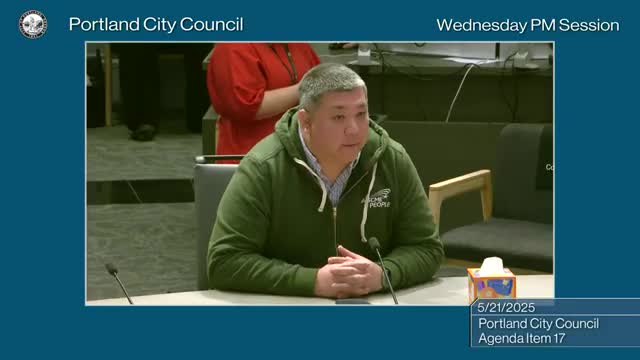Portland City Council Faces Budget Cuts Amid Community Outcry for Prosper Portland Funding
May 21, 2025 | Portland, Multnomah County, Oregon
This article was created by AI summarizing key points discussed. AI makes mistakes, so for full details and context, please refer to the video of the full meeting. Please report any errors so we can fix them. Report an error »

In the heart of Portland's City Hall, a passionate debate unfolded during the City Council meeting on May 21, 2025, as community members voiced their concerns over the proposed budget for Prosper Portland, the city's economic development agency. The atmosphere was charged with urgency, as speakers highlighted the potential impacts of budget cuts on local businesses and marginalized communities.
Mark Sherman, representing the employees of Prosper Portland, urged the council to pass a clean budget, emphasizing the dire consequences of cutting funding for economic development. He shared a personal story of loss tied to economic hardship, illustrating the human cost of financial decisions. "A budget is a moral document," he stated, calling on councilors to affirm their values and support the community.
The meeting also featured strong opposition to proposed amendments that would slash funding for Prosper Portland. Santiago Vasquez, a business development coordinator at the Native American Youth and Family Center, passionately defended the agency's role in fostering small businesses, particularly those owned by people of color. He argued that the proposed cuts would undermine years of progress and economic growth within the community.
Critics of Prosper Portland, however, raised alarms about the agency's funding practices. Some speakers accused it of perpetuating gentrification and failing to adequately support BIPOC communities. They argued that the agency should utilize its substantial strategic investment fund instead of cutting essential programs. One speaker pointedly remarked, "Prosper is trying to claim that we're defunding them. We're not defunding them," highlighting the contentious nature of the budget discussions.
As the meeting progressed, the tension between supporting economic development and addressing community needs became increasingly evident. Holly Yong, a local entrepreneur, shared her success story, crediting Prosper Portland for her business's growth. Yet, others questioned the agency's priorities, suggesting that it was hoarding resources while threatening vital community programs.
The council's decision on the budget will have lasting implications for Portland's economic landscape and its commitment to equity. As the meeting concluded, the voices of community members echoed a clear message: the future of Portland's small businesses and marginalized communities hangs in the balance, awaiting the council's next move.
Mark Sherman, representing the employees of Prosper Portland, urged the council to pass a clean budget, emphasizing the dire consequences of cutting funding for economic development. He shared a personal story of loss tied to economic hardship, illustrating the human cost of financial decisions. "A budget is a moral document," he stated, calling on councilors to affirm their values and support the community.
The meeting also featured strong opposition to proposed amendments that would slash funding for Prosper Portland. Santiago Vasquez, a business development coordinator at the Native American Youth and Family Center, passionately defended the agency's role in fostering small businesses, particularly those owned by people of color. He argued that the proposed cuts would undermine years of progress and economic growth within the community.
Critics of Prosper Portland, however, raised alarms about the agency's funding practices. Some speakers accused it of perpetuating gentrification and failing to adequately support BIPOC communities. They argued that the agency should utilize its substantial strategic investment fund instead of cutting essential programs. One speaker pointedly remarked, "Prosper is trying to claim that we're defunding them. We're not defunding them," highlighting the contentious nature of the budget discussions.
As the meeting progressed, the tension between supporting economic development and addressing community needs became increasingly evident. Holly Yong, a local entrepreneur, shared her success story, crediting Prosper Portland for her business's growth. Yet, others questioned the agency's priorities, suggesting that it was hoarding resources while threatening vital community programs.
The council's decision on the budget will have lasting implications for Portland's economic landscape and its commitment to equity. As the meeting concluded, the voices of community members echoed a clear message: the future of Portland's small businesses and marginalized communities hangs in the balance, awaiting the council's next move.
View full meeting
This article is based on a recent meeting—watch the full video and explore the complete transcript for deeper insights into the discussion.
View full meeting
